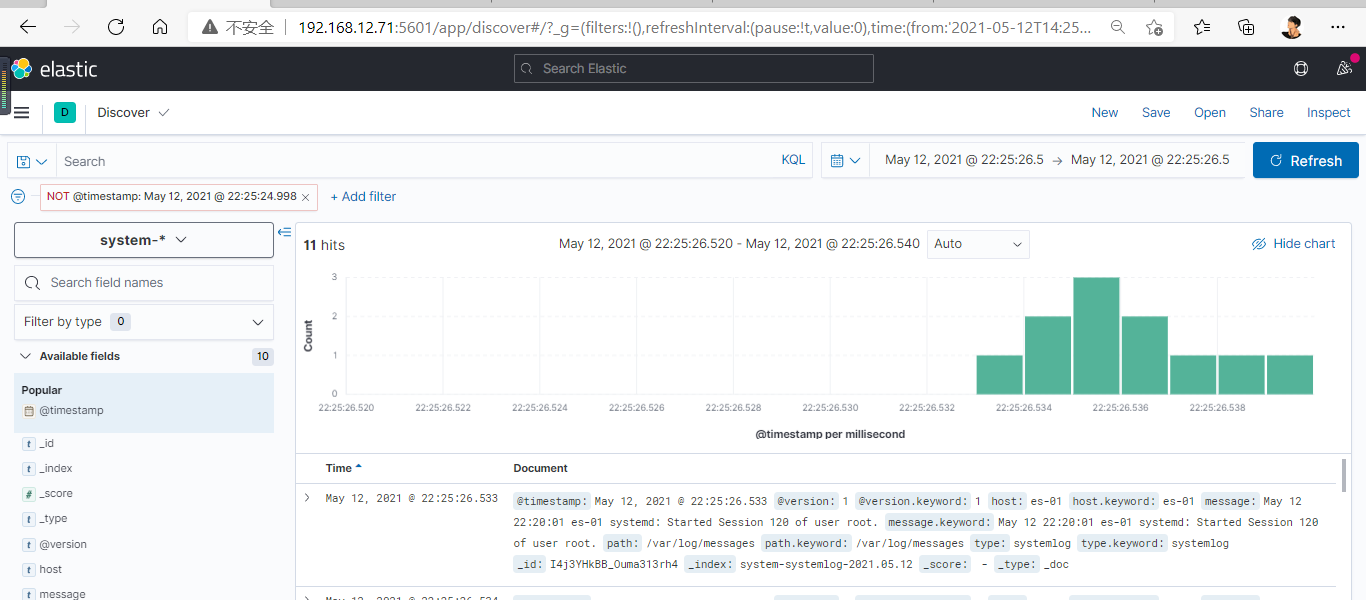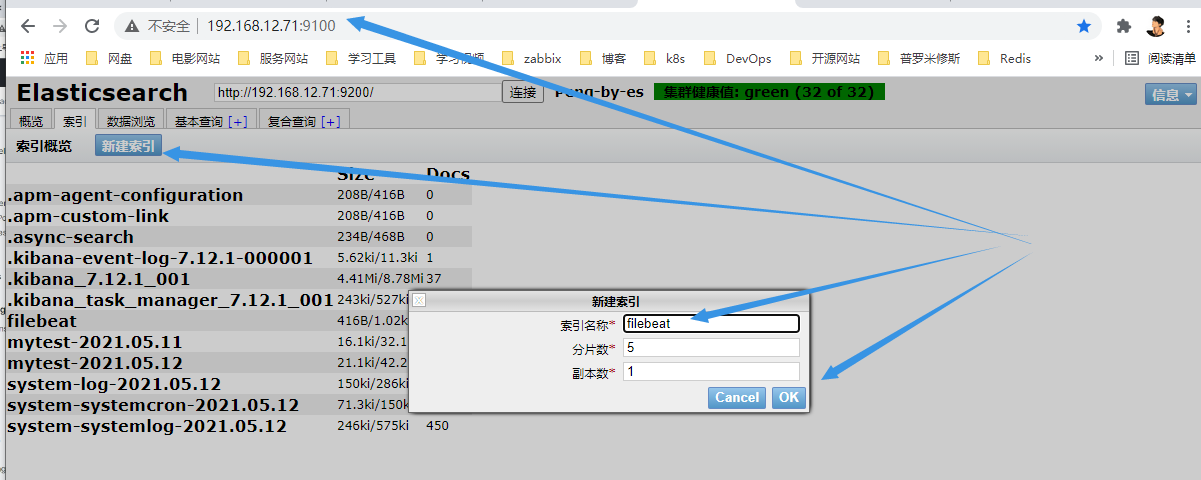ELK-day2-配置使用Filebeat
文章目录
配置使用Filebeat
轻量级日志收集组件,基本不消耗内存
主要工作:在每一台机器内收集日志,将日志同步到 > redis > logstash > Elasticsearch
所以每台机器都要装filebeat,选择对应所需组件进入下载,这里选择filebeat > 选择版本下载
1.下载安装
[root@es-01 ~]# wget https://artifacts.elastic.co/downloads/beats/filebeat/filebeat-7.12.1-x86_64.rpm
[root@es-01 ~]# yum localinstall -y filebeat-7.12.1-x86_64.rpm
2.修改配置模式
1)备份配置文件
[root@es-01 ~]# rpm -qc filebeat | grep filebeat.yml
/etc/filebeat/filebeat.yml
# 查看除注释外的内容
[root@es-01 filebeat]# egrep -v '#' /etc/filebeat/filebeat.yml | egrep '[^\ ]'
filebeat.inputs:
- type: log
enabled: false
paths:
- /var/log/*.log
- type: filestream
enabled: false
paths:
- /var/log/*.log
filebeat.config.modules:
path: ${path.config}/modules.d/*.yml
reload.enabled: false
setup.template.settings:
index.number_of_shards: 1
setup.kibana:
output.elasticsearch:
hosts: ["localhost:9200"]
processors:
- add_host_metadata:
when.not.contains.tags: forwarded
- add_cloud_metadata: ~
- add_docker_metadata: ~
- add_kubernetes_metadata: ~
# 备份后再编辑
[root@es-01 filebeat]# cp /etc/filebeat/filebeat.yml /etc/filebeat/filebeat.yml.bak
2)收集文件日志,输出到文件中
- 不同输入类型格式参考
- https://www.elastic.co/guide/en/beats/filebeat/current/configuring-output.html
- file格式:
output.file: # filebeat输出
path: "/tmp/filebeat"
filename: filebeat.log
[root@es-01 ~]# vim /etc/filebeat/filebeat.yml <<EOF
filebeat.inputs: # filebeat输入
- type: log # 可随便定义
paths:
- /var/log/messages
- /var/log/*.log
filebeat.config.modules:
path: ${path.config}/modules.d/*.yml
reload.enabled: false
setup.template.settings:
index.number_of_shards: 1
setup.kibana:
output.file: # filebeat输出
path: "/tmp/filebeat"
filename: filebeat.log
processors:
- add_host_metadata:
when.not.contains.tags: forwarded
- add_cloud_metadata: ~
- add_docker_metadata: ~
- add_kubernetes_metadata: ~
[root@es-01 filebeat]# /usr/bin/filebeat -c /etc/filebeat/filebeat.yml
[root@es-01 filebeat]# systemctl restart filebeat.service
[root@es-01 ~]# tailf /tmp/filebeat/filebeat.log
5,\"5\":0.03,\"norm\":{\"1\":0.01,\"15\":0.025,\"5\":0.015}}}}}}","input":{"type":"log"},"ecs":01","type":"filebeat","version":"7.12.1"}}
···
3)收集日志输出到redis
- https://www.elastic.co/guide/en/beats/filebeat/current/redis-output.html
- redis格式:
output.redis:
hosts: ["localhost"]
password: "my_password"
key: "filebeat"
db: 0
timeout: 5
1> 配置
filebeat.inputs:
- type: log
paths:
- /var/log/messages
- /var/log/*.log
filebeat.config.modules:
path: ${path.config}/modules.d/*.yml
reload.enabled: false
setup.template.settings:
index.number_of_shards: 1
setup.kibana:
output.redis:
hosts: ["192.168.12.72"]
password: "" # 对端redis的密码,若没有则为空
key: "filebeat"
db: 0 # 第0个数据库,redis默认有16个数据库
timeout: 5
processors:
- add_host_metadata:
when.not.contains.tags: forwarded
- add_cloud_metadata: ~
- add_docker_metadata: ~
- add_kubernetes_metadata: ~
# 添加此段,注意修改
output.redis:
hosts: ["localhost"]
password: "my_password"
key: "filebeat"
db: 0
timeout: 5
2> 重启
[root@es-01 filebeat]# systemctl restart filebeat.service
3> 对端查看
# 安装redis,并修改bind监听地址为0.0.0.0
# 启动redis
# 进入查看
[root@es-02 ~]# redis-cli
127.0.0.1:6379> KEYS *
1) "filebeat"
127.0.0.1:6379> lrange filebeat 0 -1
415) "{\"@timestamp\":\"2021-05-12T09:05:08.661Z\",\"@metadata\":{\\\"1\\\":0.03,\\\"15\\\":0.025,\\\"5\\\":0.025}}}}}}\"}"
···
redis 参考文档
https://www.elastic.co/guide/en/logstash/current/plugins-inputs-redis.html
# 配置文件放在哪无所谓,运行时指定好路径即可~
[root@es-02 ~]# vim /etc/logstash/conf.d/redis-system.conf
input {
redis {
date_type => 'list'
host => "192.168.12.72"
key => "filebeat"
port => 6379
}
}
output {
elasticsearch {
hosts => ["172.16.1.72:9200"]
index => "filebeat-systemlog-%{+YYYY.MM.dd}"
}
}
# 运行logstash
[root@es-02 ~]# /usr/share/logstash/bin/logstash -f /etc/logstash/conf.d/redis-system.conf
Using bundled JDK: /usr/share/logstash/jdk
OpenJDK 64-Bit Server VM warning: Option UseConcMarkSweepGC was deprecated in version 9.0 and will likely be removed in a future release.

5.安装配置nginx
- 使用Nginx反向代理,配置域名访问kibana
# 安装Nginx
[root@es-01 ~]# yum install -y nginx
# 配置nginx默认配置文件
[root@es-01 ~]# cat /etc/nginx/nginx.conf
# 删除尾行以下的所有配置
user nginx;
worker_processes auto;
error_log /var/log/nginx/error.log;
pid /run/nginx.pid;
# Load dynamic modules. See /usr/share/doc/nginx/README.dynamic.
include /usr/share/nginx/modules/*.conf;
events {
worker_connections 1024;
}
http {
log_format main '$remote_addr - $remote_user [$time_local] "$request" '
'$status $body_bytes_sent "$http_referer" '
'"$http_user_agent" "$http_x_forwarded_for"';
access_log /var/log/nginx/access.log main;
sendfile on;
tcp_nopush on;
tcp_nodelay on;
keepalive_timeout 65;
types_hash_max_size 2048;
include /etc/nginx/mime.types;
default_type application/octet-stream;
# Load modular configuration files from the /etc/nginx/conf.d directory.
# See http://nginx.org/en/docs/ngx_core_module.html#include
# for more information.
include /etc/nginx/conf.d/*.conf;
}
# 配置kibana域名访问
[root@es-01 ~]# cat /etc/nginx/conf.d/kibana.conf
server {
listen 80;
server_name linux.kibana.com;
location / {
proxy_pass http://172.16.1.71:5601;
}
}
# 启动Nginx
[root@es-01 ~]# systemctl start --now nginx
# 配置hosts解析
192.168.12.71 linux.kibana.com
# 访问测试
192.168.12.71:80
linux.kibana.com

4.ELK架构
# 安装filebeat
[root@es-02 ~]# wget https://artifacts.elastic.co/downloads/beats/filebeat/filebeat-7.12.1-x86_64.rpm
[root@es-02 ~]# yum install filebeat-7.12.1-x86_64.rpm
[root@es-02 ~]# vim /etc/filebeat/filebeat.yml
filebeat.inputs:
- type: log
paths:
- /var/log/messages
- /var/log/*.log
output.redis:
hosts: ["192.168.15.71"]
password: ""
key: "filebeat"
db: 0
timeout: 5
[root@es-02 ~]# systemctl start filebeat
# 安装redis
[root@es-02 ~]# yum install redis -y
[root@es-02 ~]# systemctl start redis
# 安装logstash
[root@es-02 ~]# wget https://artifacts.elastic.co/downloads/logstash/logstash-7.12.1-x86_64.rpm
[root@es-02 ~]# yum install logstash-7.12.1-x86_64.rpm -y
[root@es-01 ~]# cat redis-system.conf
input {
redis {
data_type => 'list'
host => "192.168.15.71"
key => "filebeat"
port => 6379
}
}
output {
elasticsearch {
hosts => ["172.16.1.70:9200"]
index => "filebeat-systemlog-%{+YYYY.MM.dd}"
}
}
[root@es-01 ~]# /usr/share/logstash/bin/logstash -f redis-system.conf
# elasticsearch
[root@es-01 ~]# grep -E '^[^#]' /etc/elasticsearch/elasticsearch.yml
cluster.name: chenyang-by-es
node.name: chenyang-node-01
path.data: /var/lib/elasticsearch
path.logs: /var/log/elasticsearch
bootstrap.memory_lock: true
network.host: 0.0.0.0
http.port: 9200
http.cors.enabled: true
http.cors.allow-origin: "*"
cluster.initial_master_nodes: ["172.16.1.70"]
discovery.zen.minimum_master_nodes: 2
discovery.zen.ping.unicast.hosts: ["172.16.1.70","172.16.1.71"]
# 安装kibana
[root@es-02 ~]# grep -E '^[^#]' /etc/kibana/kibana.yml
server.port: 5601
server.host: "172.16.1.71"
elasticsearch.hosts: ["http://172.16.1.70:9200"]
# 优化
[root@es-01 ~]# yum install nginx -y
[root@es-01 ~]# vim /etc/nginx/conf.d/kibana.conf
server {
listen 80;
server_name kibana.default.cluster.local.com;
auth_basic "User Authentication";
auth_basic_user_file /etc/nginx/auth;
location / {
proxy_pass http://172.16.1.71:5601;
}
}
server {
listen 80 default_server;
server_name locahost;
return 302 http://kibana.default.cluster.local.com;
}


 浙公网安备 33010602011771号
浙公网安备 33010602011771号